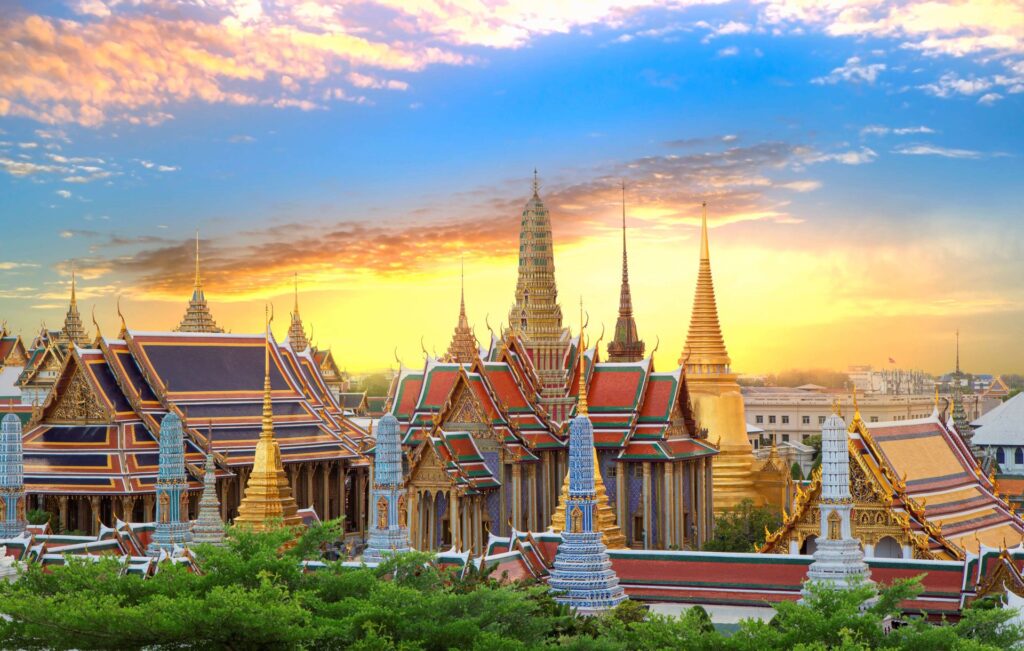Adjusting to Thai Culture as an Expat

A culture with ancient ties and ultra modern living
Last updated on August 28th, 2025 at 11:03 am
As Thailand continues its rapid industrialization and development, understanding its culture becomes even more crucial for Expats. There’s never been a better time to learn about Thai customs and traditions.
Moving to Thailand can be an exhilarating and enriching experience, but adapting to a new culture can also pose its challenges. From language barriers to daily customs, understanding Thai culture is crucial for any expat wishing to make the most of their stay. This guide provides practical advice on how to embrace and respect the local customs and traditions while enjoying your new life in this vibrant country.
1. Understand the Basics of Thai Etiquette: Thai culture places a high value on politeness and respect. Simple gestures like the traditional ‘wai’ greeting, where you press your palms together near your chest and bow slightly, are significant. Always remember to remove your shoes before entering someone’s home and many public places like temples and sometimes even shops. Do not talk while in trains, buses, sky trains and elevators out of respect for others that are in close proximity.
2. Learn Key Phrases in Thai: Communication is the heart of cultural adaptation. Learning basic Thai phrases not only eases everyday interactions but also shows respect for the local culture. Start with greetings, thank-yous, and common questions. Thais appreciate any effort foreigners make to speak their language, often responding with encouraging smiles and warmth. this can also help you immesenyl in negotiating prices and get service.
3. Navigate the Social Hierarchies: Thai society is structured around hierarchies based on age, job positions, and social status. Be mindful of these hierarchies in social and professional settings. Showing respect to elders and superiors is crucial and can be as simple as allowing them to lead conversations or making sure they are the first to eat at meals.
4. Be Mindful of the Monarchy: The Thai monarchy is deeply revered, and it’s essential to show respect towards the King and his family. Avoid criticizing the monarchy, a practice that is not only frowned upon but is also illegal under Thai law.
5. Adjusting to ‘Thai Time’: The concept of time in Thailand can be more flexible than in many Western cultures. Patience is a virtue here, and it’s often useful to adopt a more relaxed attitude towards schedules and punctuality when possible.
Important points of this section;
- Understanding and respecting Thai cultural values is essential for successful integration
- Mastering basic Thai etiquette and customs can prevent common social mishaps
- Building relationships through cultural sensitivity leads to a more enriching experience.
Parts of Thailand are more Westernized than others.
Living in major cities like Bangkok, Pattaya, or Phuket offers a unique experience, but it often limits your exposure to authentic Thai culture. In these urban areas, many locals are proficient in basic Western languages and have adapted their behavior to cater to tourists, which can create a superficial understanding of Thai traditions and lifestyle.
In contrast, venturing into the countryside, particularly in smaller villages, reveals a richer and more genuine aspect of Thai culture. Here, expatriates may face greater challenges due to significant cultural differences that can impact daily life. However, these challenges often lead to more rewarding experiences.
Many expatriates initially settle in larger cities, but as they become more familiar with Thai culture, a considerable number choose to relocate to rural areas, finding a deeper connection and appreciation for the local way of life.
Did you know...The Thai year is 543 years ahead of the western system?
In 2025, the Thai year is 2568, as the Thai calendar is 543 years ahead of the Gregorian calendar commonly used in the West. This difference is important to note, especially when dealing with official documents in Thailand, where the Thai date is predominantly utilized. Understanding this distinction can help avoid confusion in communication and documentation.
Did you know... Showing affection in Public is Impolite
Despite many Westerners’ perceptions of Thailand as the world’s sex metropolis, Thai tradition frowns on public shows of affection. Thai People are uncomfortable with showing affection in public. Kissing in public is frowned upon and considered impolite. Couples holding hands have become more common in Thailand with the younger population in recent years.
Being Angry or Frustrated regardless of the reason is going to make any situation worse when communicating with a Thai. The more angry you get, the less likely they will be agreeable to you. While Thais are more likely to remain clam outwardly, they will be feeling personally insulted by this behavior. Another important point is that any Thais that see or heard this will are likely to take the Thai person’s side, and it is perceived as insulted them.
Did you know... Keeping Face is very important to Thais
When engaging in communication with Thai individuals, it is crucial to recognize the cultural significance of saving face (not admitting they were wrong). In Thai society, losing face is considered a profound insult, and it is essential to avoid embarrassing Thais in public settings. This means steering clear of direct criticism or making someone appear incorrect in front of others. The preservation of dignity often takes precedence over the subject-matter of the conversation itself. If misunderstandings arise, approach the situation with a calm demeanor and seek to resolve issues without placing blame. This respectful approach will foster better outcomes and strengthen relationships.
Did you know...Defamation is a Serious Offense
In Western countries, expressing opinions about individuals or businesses is often seen as a normal part of public discourse. However, in Thailand, such expressions can lead to serious civil or criminal repercussions. Insulting someone or a business, even in private conversations among expatriates, can result in significant legal trouble if overheard or recorded.
Particularly sensitive is the topic of the royal family; any derogatory remarks are considered a grave offense and are strictly prohibited. Therefore, it is advisable for expatriates to refrain from commenting on Thai politics or engaging in discussions that could be perceived as disrespectful. Understanding and respecting local customs and laws is crucial for maintaining a harmonious living experience in Thailand.
Unique challenges for expats living in Thailand
As an expatriate from a Western country, relocating to Thailand presents a unique set of lifestyle adjustments that can significantly impact your daily life. While most of these changes can enhance your experience, some may pose challenges depending on your background and adaptability. Below, we delve into some of the most common and potentially challenging differences you may encounter when adjusting to Thai culture.
Understanding the Thai Language
One of the foremost hurdles is the Thai language, which is often regarded as one of the most difficult languages to learn. Thai is a tonal language, meaning that the tone in which a word is spoken can alter its meaning entirely. Additionally, the writing system is derived from ancient scripts, making it visually and linguistically complex. Cultural nuances further complicate translations, as many phrases and expressions do not have direct equivalents in English or other Western languages. This topic warrants further exploration, as mastering the language can greatly enhance your integration into Thai society.
Cultural and Lifestyle Differences
Beyond language, understanding the cultural and lifestyle differences is crucial. The Thai way of thinking can be quite distinct from Western perspectives, which may lead to misunderstandings. For instance, the rules and norms governing daily life, including driving practices, can be markedly different. In Thailand, driving is often perceived as the opposite of Western norms, with a more relaxed approach to traffic regulations.
Legal System Insights
Familiarizing yourself with the Thai legal system is also essential. The legal framework differs significantly from what you are accustomed to, and understanding how laws are enforced and how disputes are resolved can help you navigate potential challenges.
Relationships and Social Dynamics
The dynamics of relationships in Thailand, whether between couples, family members, business partners, or friends, are often viewed through a different lens. Family ties are particularly strong, and the responsibilities towards family members frequently take precedence over personal relationships. For expatriates seeking a partner, it is important to recognize that a Thai woman’s priorities may include caring for her family—parents, siblings, and children before considering her relationship with you. This cultural aspect is vital to understand as it can influence your relationship dynamics.
Socializing and Dining Culture
Socializing plays a significant role in Thai life, with meals often serving as a central aspect of social interaction. Eating is not merely a necessity; it is a lifestyle that can involve multiple meals throughout the day. Engaging in communal dining experiences can foster connections and deepen your understanding of Thai culture.
In conclusion, while the transition to life in Thailand can be filled with challenges, it also offers numerous opportunities for personal growth and cultural enrichment. By embracing these differences and seeking to understand the local customs, you can enhance your experience as an expatriate in this vibrant country.
Socializing is integral to Thai culture, with meals often at the heart of social interactions. Dining is not just about sustenance; it embodies a lifestyle characterized by multiple (as many as 7) meals throughout the day. Participating in communal dining not only strengthens relationships but also enriches your appreciation of Thai traditions. We’re sharing a meal with Thais, it is common to share all the diner plates as a community eating experience. Spicy food are a main ingredient in meals, so if you can’t do spicy, be sure to say “mai pet” or “no spicy” please.
In summary, adapting to life in Thailand may present challenges, yet it also opens doors to personal development and cultural insights. By welcoming these differences and striving to grasp local customs, you can significantly enhance your experience as an expatriate in this dynamic nation.
External Reference Links:
Siam Legal : What is defamation law in Thailand
Kru teacher :Tips for adjusting to Thai culture

